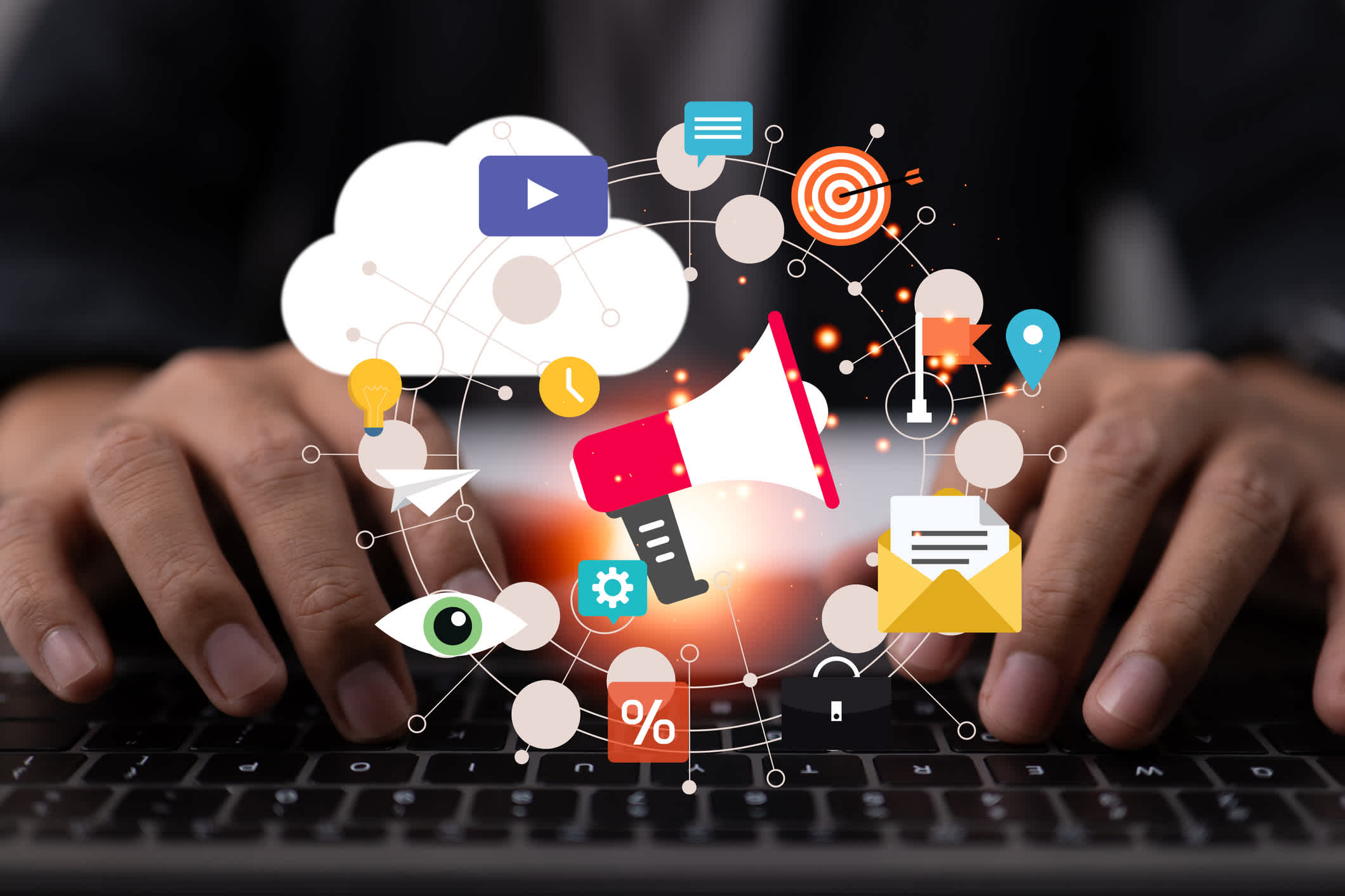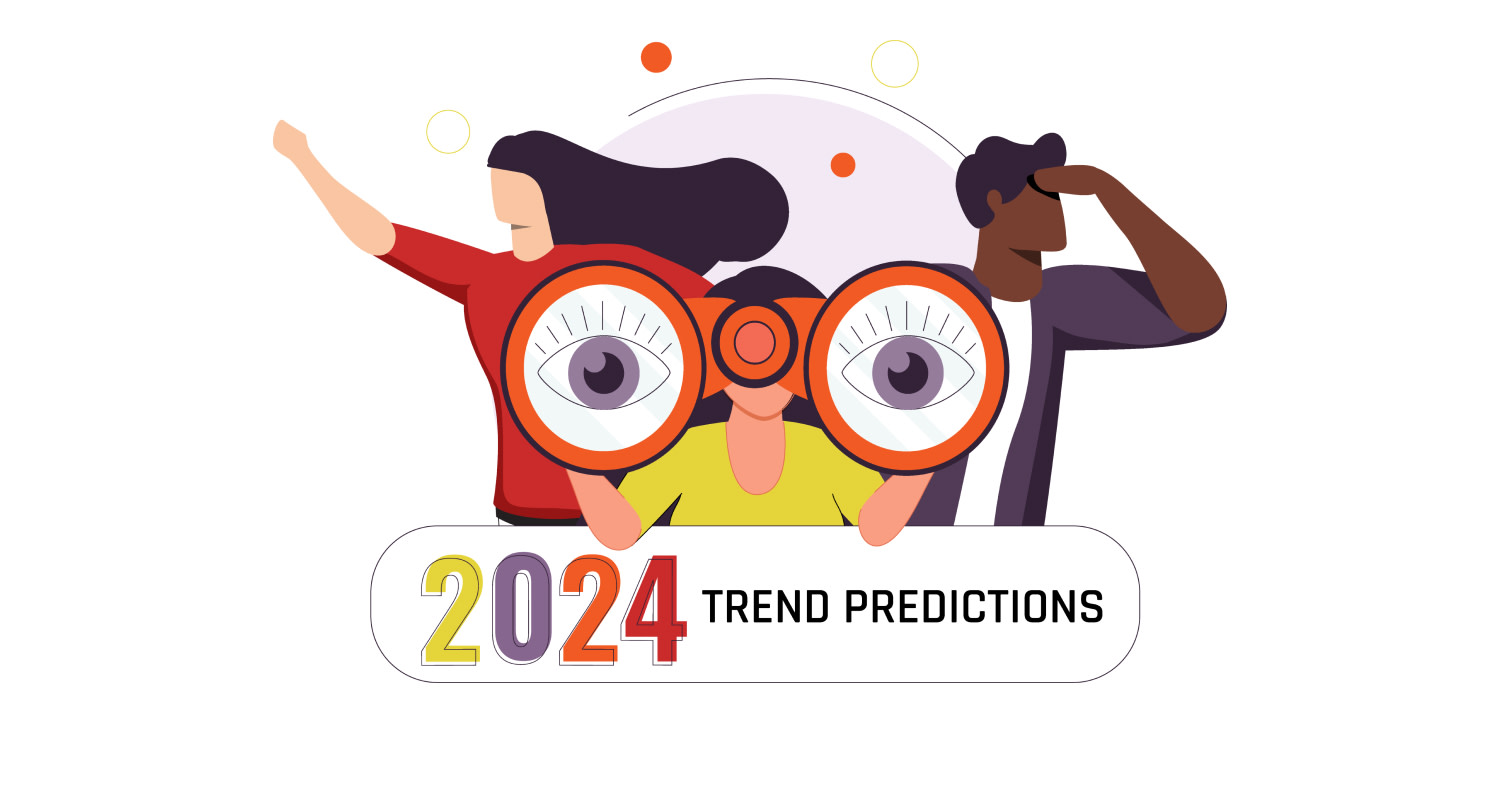//
Dec 22, 2023
6 Business Marketing Predictions That Will Shape 2024
"Interruptive marketing" began with the first billboard in the Mid-19th century. The billboard, although static compared to today's dynamic , represented a groundbreaking shift from relying solely on word-of-mouth and print media.
This interruption-based approach became ingrained in the advertising landscape, shaping consumer expectations and the very fabric of marketing strategies.
Today, the interplay between technology, consumer expectations, and marketing innovations continue to challenge businesses to adapt and find resonance in the ever-evolving landscape of consumer engagement.
If a marketer from the 1800s met a marketer in 2024, it might be like the . Perhaps I'm showing my age, but it would definitely feel like an encounter with a strange, futuristic world, with faint remnants of past marketing solutions that have paved the way for this new landscape.
And if that 1800s marketer were to inquire about the marketing trends on the horizon for 2024, here's where I see things heading.
1. Bots and Humans Working Harmoniously Together

AI chatbots and machine learning advancements are widely used in various industries, and are only becoming more intermeshed. Understandably, this development worries many of us—will robots take over the world with zeros and ones?–but excites us as well.
Rest assured, the trend with AI in 2024 is about , and tools like AI, ML, VR, and AR can help, not replace authenticity.
Here’s what to prepare for:
Predictive Analytics and Automation
AI transforms marketing through predictive analytics, enabling trend anticipation and precise decision-making. Embracing transparent AI is crucial, with planning to integrate its capabilities for enhanced efficiency and data analytics.
Rise of Machine Customers: Adapting to Autonomous Decision-Makers
The "" trend is rising, where autonomous systems make purchasing decisions.
Businesses need to adjust strategies for machine customers alongside traditional consumer segments, with CEOs foreseeing up to 20% of revenue from machines by 2030.
The “thumb-stopping effect”:
Future marketing aspirations involve immersive brand storytelling, personalized digital avatars, and captivating experiences.
Augmented Reality (AR) will play a pivotal role, creating a "" effect.
“Thumb-stopping” is the skill to craft content that literally makes people pause and take notice. It has the potential to distinguish us, establish credibility, and leave a lasting impression. The objective isn't merely to generate content; it's about producing content that compels individuals to halt their scrolling.
Although the rapid generation of content through AI has proliferated the digital sphere, it has concurrently sparked a debate over the balance between efficiency and effectiveness.
Brand Authenticity in the AI Age:
In the dynamic realm of AI-driven marketing, the key to success remains brand authenticity. Despite the influx of AI-generated content, is vital.
Marketers should prioritize human connection, share , and foster transparent communication to build enduring trust in the age of AI-generated content.
2. Hyper-Personalization in Account-Based Marketing

Hyper-personalization in Account-Based Marketing (ABM) refers to the advanced and highly tailored approach of delivering personalized content and experiences to individual target accounts.
This evolution signifies a departure from traditional marketing strategies, moving towards a more refined and precise method of engaging with specific accounts.
Hyper-personalized ABM messaging and content caters to the individual needs of each target account, going beyond generic tactics and considering specific characteristics and behaviors within organizations.
Key elements of hyper-personalization in ABM include:
- Individualized content: Create content tailored to the specific industries, roles, and pain points of the individuals within the target accounts. This ensures that the content resonates with the audience on a personal level.
- Customized User Journeys: Design personalized pathways for each target account, considering their engagement history, interactions with the previous content, and their position in the buying cycle. This ensures a seamless and relevant user experience.
- Dynamic Messaging: Adapt messages in real-time based on the recipient's behavior, preferences, and interactions. This flexibility allows marketers to respond to changes in the target account's needs and priorities.
- Data-Driven Insights: Leverage data analytics and insights to understand the behavior and preferences of target accounts. This data-driven approach ensures that concrete information rather than assumptions that inform personalization.
Businesses are driving the evolution towards hyper-personalization in ABM by demanding more meaningful and relevant interactions with their target accounts.
By tailoring marketing efforts to the individual characteristics of each account, companies can build stronger relationships, enhance engagement, and ultimately drive more successful outcomes in their ABM strategies.
3. From "Sorry To Interrupt" to "Let's Have a Conversation": Engaging with Experiences

In 2024, connecting with your target audience goes beyond interruption—creating meaningful interactions that captivate, involve, and resonate.
Here are some strategies, tools, and innovations empowering brands to go beyond the ordinary, fostering compelling and mutually beneficial dialogues.
Video Will Still Reign in 2024:
Video Marketing is the ultimate game-changer in B2B, captivating audiences with clear messaging, emotional impact, and deep engagement. Fostering a strong connection with viewers fuels its rise by telling compelling stories. Accessible on various platforms, videos ensure widespread reach.
Innovations like live streaming and interactive content enhance the immersive experience, providing creative ways for B2B marketers to connect.
As B2B marketing evolves, Video Marketing remains the go-to tool, thanks to its adaptability, effectiveness, and connection with diverse audiences—a strategic response to changing consumer preferences.
Innovations in Social Media Marketing:
Social media marketing is evolving rapidly, bringing transformative innovations that redefine how businesses engage with audiences.
Here are key social media marketing trends shaping this landscape:
- Augmented Reality (AR) Experiences: Social media platforms integrate AR features, allowing brands to create interactive experiences using filters, lenses, and effects.
- Ephemeral Content and Stories: The popularity of temporary content, like Stories on platforms like Instagram and Snapchat, has surged, fostering authenticity and real-time connection.
- Social Commerce Integration: E-commerce features within social platforms streamline product discovery, providing seamless shopping experiences and transactions.
- Interactive and Poll-based Content: Interactive content, including polls and quizzes, boosts engagement and creates a vibrant, participatory community.
- Live Streaming and Real-time Engagement: Live streaming allows brands to connect authentically with audiences, fostering a sense of community and shared experience.
- Personalized and Targeted Advertising: Social media platforms employ advanced algorithms for highly relevant, personalized advertisements, enhancing campaign effectiveness.
- Inclusive and Diverse Content:
- Brands emphasize inclusivity and diversity in content, resonating with broader audiences and aligning with societal values.
Personalization at Scale:
This means AI and ML to tailor experiences for each customer across touchpoints. This goes beyond traditional strategies, allowing marketers to create individualized interactions.
Key elements include AI analysis, targeted segmentation, dynamic content generation, predictive analytics, cross-channel consistency, real-time adaptation, and enhanced customer engagement.
Overall, it's a sophisticated approach leveraging advanced technologies to create personalized experiences for customers, fostering deeper connections throughout the customer journey.
4. GDPR, Blockchain, and Data Privacy Compliance

Safeguarding privacy and data protection is crucial as businesses rely on data-driven strategies to connect with their audience.
Compliance with regulations like GDPR is a legal requirement and a foundation for ethical data handling. With rising cyber threats, measures is vital to uphold the reputation of B2B brands and build trust with clients.
Businesses embracing data privacy principles will likely forge stronger client relationships, ensuring compliance, ethical practices, and success in B2B marketing strategies in the evolving landscape of 2024 and beyond.
GDPR is vital in B2B marketing, shaping global business strategies. It mandates obtaining consent, ensuring transparency, and implementing security measures. This leads to strategy shifting, focusing on targeted and permission-based approaches.
Businesses must prioritize explicit consent and transparent communication and invest in technologies for compliance. Embracing privacy-by-design principles, they integrate data protection into product development.
Overall, GDPR compliance is foundational for ethical data handling building trust for long-term success in B2B marketing.
Blockchain
Blockchain is reshaping B2B marketing with enhanced transparency, security, and smart contracts. It reinvents transparency by providing a secure, traceable ledger. Its robust security, driven by , safeguards customer data and reduces the risk of fraud. Smart contracts evolve, automating processes and ensuring precise execution.
Blockchain introduces an immutable reputation record, fosters trust, and decentralizes data control, enhancing privacy. In conclusion, blockchain's impact is profound, promising a future where B2B transactions are secure, transparent, and efficient, transforming trust in business interactions.
5. Unraveling the Dynamics of Advertising Across Platforms: Transformations in Bidding and Attribution

The evolving landscape of digital paid media platforms such as Google Ads, LinkedIn Ads, Meta, and others offers new possibilities.
Ad-Free Experiences (and the Subscription fees) are Being Embraced
In 2024, a notable shift in social media dynamics involves the rise of ad-free paid subscription models, catering to the escalating demand for uninterrupted online experiences. Platforms like Snapchat, Reddit, , and TikTok are embracing this trend.
For B2B companies, this shift is not just about adjusting to consumer preferences but also redefining the value proposition. Recognizing the growing desire for seamless interactions, platforms are reshaping the exchange between businesses and their audience, emphasizing the importance of uninterrupted engagement.
This trend reflects a transformative evolution in social media dynamics for B2B entities, influencing how they connect with their target audience.
Influencers and User-Generated Content Are Reshaping Revenue Models
The surge of influencers and user-generated content (UGC) marks a departure from traditional ad-focused revenue models, reshaping online platforms and creating new income streams.
Platforms, formerly reliant on brands paying for ad space, now diversify revenue through collaborations with influencers. This involves sponsored content, product placements, and affiliate marketing, leveraging content creators' authentic influence and reach.
Simultaneously, content creators, including influencers and UGC contributors, actively contribute and monetize their creativity. This shift enriches platforms with varied revenue streams and empowers content creators, fostering a dynamic landscape where authenticity and creativity thrive.
AR and VR Ads are Evolving How We Experience Brand Communications
AR and VR are now integral to B2B advertising, revolutionizing how industrial brands, including manufacturing and water utilities, engage stakeholders. These technologies offer immersive experiences, surpassing the capabilities of traditional methods.
In B2B, AR enables interactive engagement with complex products. For example, a manufacturing company can use AR for clients to visualize new equipment within their operational setup. Similarly, water utilities can employ VR for realistic previews of infrastructure projects.
This heightened interaction enhances stakeholder experiences, fostering well-informed decision-making and boosting engagement in the B2B sector.
Digital Advertising Efforts Move Firmly to Value-Based Bidding
In the landscape of B2B advertising set to unfold in 2024, a seismic shift is poised to occur as , once stalwarts of data-driven targeting, face increasing challenges under the scrutiny of stringent data regulations. The evolving regulatory landscape compels B2B advertisers to pivot towards value-based bidding strategies, forging a path away from traditional cookie-dependent approaches.
As the sun sets on the era of unrestricted data collection, marketers are recalibrating their compass towards data-centric strategies, recognizing the need to navigate with finesse through a privacy-focused terrain.
The essence of value-based bidding lies not just in the bid for impressions but in the bid for meaningful engagements and genuine connections. Advertisers will strategically bid on opportunities that align with their target audience's preferences, interests, and the intrinsic value they can provide.
The orchestration of this transformative journey involves the strategic deployment of artificial intelligence (AI) as a guiding force. AI-enhanced advertising performance helps businesses gain profound insights into customer behavior. Its analytical prowess enables marketers to decipher intricate patterns, predict user preferences, and tailor campaigns with surgical precision.
B2B advertisers, recognizing the power of AI, will integrate it into their arsenal, not merely as a technological embellishment but as a strategic imperative to stay ahead in the dynamic digital landscape.
In this paradigm shift, the optimization of promotional strategies assumes paramount importance. Advertisers will scrutinize and refine their campaigns not just based on clicks and impressions but on the tangible value they generate.
The focus shifts towards outcomes, be it lead generation, conversions, or fostering long-term customer relationships. Each promotional endeavor becomes a deliberate investment, evaluated not just by the volume of interactions but by the quality and resonance of each engagement.
6. Transformations in CSR and ESG Reporting for 2024: A Focus on Sustainability and Corporate Social Responsibility

In today's business landscape, how companies engage in business practices, treat employees, and their contributions to the community, environment, and social governance is more crucial than ever for customer trust.
Tips for Business Owners on Enhancing CSR and ESG Reporting in 2024:
Adopt Holistic Assessment Beyond Metrics
Shift your focus from relying solely on quantitative metrics to embracing comprehensive evaluations.Recognize and emphasize the significance of qualitative impacts resulting from your CSR and ESG initiatives.
Embrace Integrated Reporting
Depart from the conventional practice of separating financial and non-financial aspects. Seamlessly integrate narratives about your CSR and ESG efforts into comprehensive performance reports.
Leverage Technological Transparency
Harness technology, including blockchain, to enhance the transparency of your reporting practices. Ensure the integrity and traceability of your CSR and ESG data, thereby boosting credibility.
Conclusion: Prepare, Plan, and Budget for the Future of B2B Marketing in 2024
As we navigate the dynamic landscape of B2B marketing in 2024, a profound transformation unfolds, driven by technological evolution, consumer-centric approaches, and ethical imperatives. The integration of AI, hyper-personalization, and the reshaping of paid media dynamics herald a new era.
Yet, amidst innovation, the pillars of authenticity, sustainability, and social responsibility emerged as guiding principles, signaling a paradigm shift.
The rise of interactive content, influencer-driven models, and cutting-edge CSR reporting amplifies the need for a delicate balance between innovation and timeless values. Success in this era of change hinges on businesses adeptly navigating the intricate interplay of technology, consumer trust, and social impact.
The future of B2B marketing lies not merely in technological prowess but in cultivating genuine connections, transparency, and responsible practices—charting a purposeful course in the ever-evolving digital frontier.
Elevate Your 2024 Marketing Strategy with Watermark!
Plan for marketing success in 2024 with Watermark! Schedule a FREE meeting to explore tailored solutions for your business. We've got you covered from cutting-edge technologies to refining B2B strategies and ensuring GDPR compliance.







